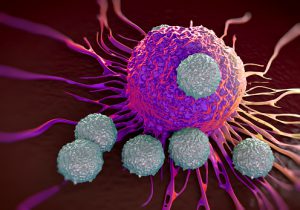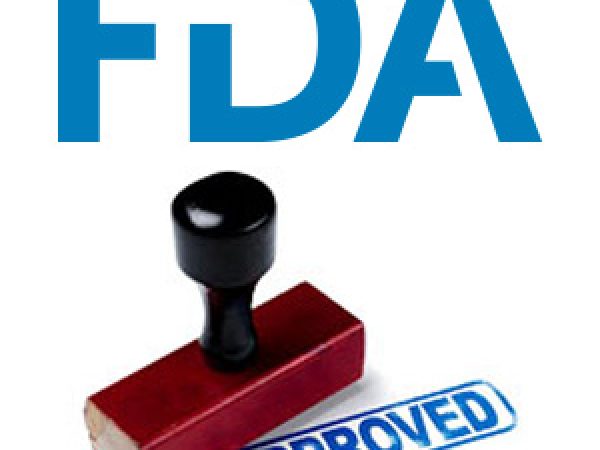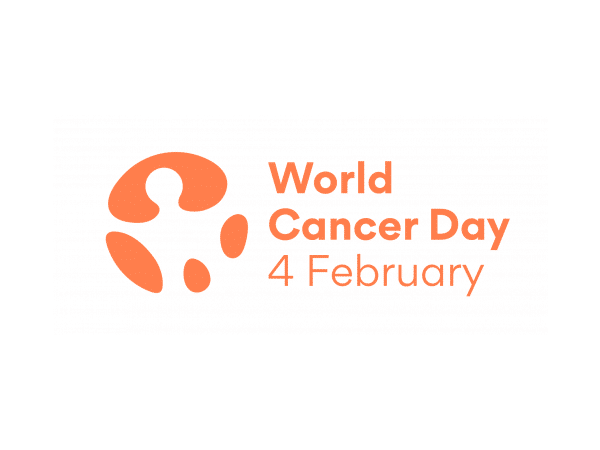AACR Annual Meeting 2018: A Round-up of Practice-changing Lung Cancer Immunotherapy Clinical Trials
Monday ushered in a ray of hope and promise for the lung cancer community at the AACR Annual Meeting 2018 – the clinical trial plenary session featured blockbuster trials testing immune checkpoint inhibitors, a class of immunotherapeutics that has been revolutionizing cancer treatment in recent years, for certain patients with early-stage lung cancer and as first-line therapy for advanced lung cancer.
 Most of the U.S. Food and Drug Administration (FDA) approvals of immune checkpoint inhibitors that target the PD1/PDL1 axis for certain advanced and metastatic non-small cell lung cancers (NSCLC) are for use as second-line therapy, meaning that only those patients with advanced disease who had not had success with prior therapies are eligible to receive these treatments. But studies show that the majority of patients with advanced disease experience rapid clinical deterioration as the disease progresses, and only a small proportion of them receive second or subsequent lines of therapy.
Most of the U.S. Food and Drug Administration (FDA) approvals of immune checkpoint inhibitors that target the PD1/PDL1 axis for certain advanced and metastatic non-small cell lung cancers (NSCLC) are for use as second-line therapy, meaning that only those patients with advanced disease who had not had success with prior therapies are eligible to receive these treatments. But studies show that the majority of patients with advanced disease experience rapid clinical deterioration as the disease progresses, and only a small proportion of them receive second or subsequent lines of therapy.
Three of the four clinical trials presented here studied whether patients newly diagnosed with advanced NSCLC will have improved survival rates when treated with the checkpoint inhibitors pembrolizumab (Keytruda), nivolumab (Opdivo), or atezolizumab (Tecentriq), as first-line therapy. In the fourth trial, the investigators tested whether immune checkpoint inhibition prior to surgical resection of early-stage NSCLC would lower the relapse rates in this patient population.
Chairperson Alice T. Shaw, MD, PhD, who opened this clinical trial session, said, “Today’s clinical trial plenary session will feature studies that showcase the enormous benefit of immunotherapies in patients with lung cancer.”
Shaw, who is an attending physician in the Center for Thoracic Cancers at Massachusetts General Hospital and an associate professor of medicine at Harvard Medical School, noted, “These studies are both groundbreaking and practice-changing.”
KEYNOTE-189: Pembrolizumab plus chemotherapy improved overall survival in treatment-naïve patients
Leena Gandhi, MD, PhD, associate professor in the Department of Medicine and director of Thoracic Medical Oncology Program, Perlmutter Cancer Center at NYU Langone Health, presented data from KEYNOTE-189, a randomized, double-blind, phase III study of pembrolizumab as first-line treatment in patients with metastatic nonsquamous NSCLC.
In this trial, 616 patients were randomized, 2:1, to receive pemetrexed and a platinum-based chemotherapy plus either pembrolizumab (test arm) or placebo (control arm).
“Adding pembrolizumab to pemetrexed and platinum induction therapy with pemetrexed maintenance therapy significantly improves OS [overall survival], PFS [progression-free survival], and ORR [objective response rate] in patients with untreated metastatic nonsquamous NSCLC who do not carry sensitizing EGFR or ALK alterations,” said Gandhi.
In May 2017, the FDA approved the use of pembrolizumab plus carboplatin-based chemotherapy as first-line treatment for patients with advanced nonsquamous NSCLC based on data from the phase II cohort G of the KEYNOTE-021 study. However, physicians had not widely adopted this treatment option in the absence of positive results from a phase III study, Gandhi explained.
The results from this phase III trial, also simultaneously published in The New England Journal of Medicine, are practice-changing, she noted.
After a median follow-up of 10.5 months, median OS was not reached in the test arm, and it was 11.3 months in the control arm; compared with patients in the control arm, those in the test arm were 51 percent less likely to die. Median PFS was 8.8 months for the pembrolizumab arm, and 4.9 months for the control arm.
“In a landmark analysis at 12 months, 69.2 percent of the patients in the combination arm would be predicted to be alive as compared with 49.4 percent of those in the control arm,” Gandhi said.
“Is pembrolizumab plus pemetrexed the new standard of care for first-line treatment of metastatic nonsquamous NSCLC?” asked study discussant Roy Herbst, MD, chief of Medical Oncology and professor of Medicine and Pharmacology at Yale Comprehensive Cancer Center. “The answer is yes,” he concluded.
IMpower150: Progression-free survival was improved with first-line atezolizumab combination across PD-L1 subgroups regardless of the assay used
Data from IMpower150, a randomized, phase III trial, showed that the anti-PD-L1 inhibitor atezolizumab, given as first-line treatment in combination with bevacizumab (Avastin) and chemotherapy for patients with nonsquamous metastatic NSCLC, prolonged PFS compared with patients who received bevacizumab and chemotherapy only, regardless of PD-L1 expression, based on the SP142 IHC assay.
The study presented here compared the PFS results between patients whose tumors were tested for PD-L1 status using one of the two IHC assays used, SP142 and SP263.
Mark A. Socinski, MD, executive medical director of the Florida Hospital Cancer Institute, noted that the trial met the primary endpoint of overall survival, and PFS benefit was seen in patients with chemotherapy-naïve nonsquamous NSCLC across all PD-L1 subgroups, regardless of the assay used. Clinically meaningful PFS benefit was observed in patients with EGFR/ALK genomic alterations in their tumors, and in patients with liver metastases, he added.
“These data suggest that atezolizumab plus bevacizumab and chemotherapy provides a new treatment option for the key patient populations,” Socinski said.
Study discussant Justin F. Gainor, MD, assistant professor of medicine at the Massachusetts General Hospital at Harvard Medical School said, “IMpower150 is the first randomized study to demonstrate significant benefit with checkpoint blockade among EGFR-positive/ALK-positive patients.”
He added, “These results will need to be viewed in the context of the changing first-line landscape of NSCLC, including the recently reported KEYNOTE 189 results.”
Checkmate -227: First-line nivolumab-ipilimumab combination improved progression-free survival
CheckMate -227 is a large, open-label, randomized phase III trial of nivolumab, nivolumab plus ipilimumab, or nivolumab plus platinum-doublet chemotherapy (PT-DC) versus PT-DC in patients with stage 4 or recurrent NSCLC who had not received prior treatment.
Matthew Hellmann, MD, assistant attending at Memorial Sloan Kettering Cancer Center, presented data on the comparison between the nivolumab-ipilimumab combination and PT-DC. In this trial, in addition to studying tumor PD-L1 expression as a biomarker, tumor mutational burden (TMB) was also tested as a biomarker based on recent data suggesting its predictive value. TMB is independent of PD-L1 expression, and characterizes about 45 percent of patients with NSCLC, Hellmann noted.
Of the 299 patients with high TMB (defined as 10 mutations/Mb), 139 received nivolumab plus ipilimumab and 160 received chemotherapy. After a minimum follow-up of 11.5 months, patients with high TMB who received the immunotherapy combination were 42 percent less likely to have their disease progress compared with those who received PT-DC.
The ORR was 45.3 percent in patients with high TMB who received nivolumab plus ipilimumab, compared with 26.9 percent in those who received PT-DC.
“The results show that in TMB-high NSCLC patients, nivolumab plus ipilimumab provides improved benefit compared to chemotherapy, increases benefit compared to anti-PD-1 monotherapy, yields durable responses, spares the use of chemotherapy in the first-line setting, and could preserve an effective option in the second line of therapy, if needed,” Hellmann said.
“These practice-changing data establish the combination of nivolumab plus ipilimumab as a first-line treatment option for patients with high-TMB NSCLC,” he added.
These data were simultaneously published in The New England Journal of Medicine.
Study discussant Naiyer Rizvi, MD, director of thoracic oncology and director of immunotherapeutics for the Division of Hematology and Oncology at Columbia University Medical Center, noted that it is now becoming evident that the role that passenger mutations play are as important as that of the driver mutations.
Given the fact that in both KEYNOTE-189 and CheckMate -227, patients benefited from immune checkpoint inhibitors regardless of tumor PD-L1 expression, the question came down to whether patients should still be tested for tumor PD-L1 expression as a biomarker.
“I don’t think we are necessarily ready to use only TMB. I think that PD-L1 is also important,” Rizvi said. Herbst had noted earlier that studying PD-L1 expression still has value, particularly because the survival data from the pembrolizumab study appeared to track with PD-L1 status.
We have good biomarkers, but we need more studies and newer biomarkers, noted Herbst.
Neoadjuvant treatment of early-stage lung cancer with nivolumab yielded promising results
Neoadjuvant therapy, or systemic or radiotherapy treatments given prior to surgical resection of a tumor, is traditionally given to lung cancer patients to shrink a large, nonmetastasized tumor located near an important organ or a blood vessel. The primary goal is to shrink the tumor prior to surgery to improve surgical outcomes.
In a clinical trial, Drew Pardoll, MD, PhD, director of Bloomberg~Kimmel Institute for Cancer Immunotherapy and director of Cancer Immunology at Johns Hopkins School of Medicine, and colleagues tested whether neoadjuvant treatment with an anti-PD1 in patients with stage 1-3 NSCLC might induce T cells against the tumor antigens that would then systemically reach micrometastases in distant sites and attack them. The investigators hypothesized that the primary tumor would act like a vaccine to initiate the T-cell response.
Pardoll and colleagues enrolled 21 patients with early-stage, resectable NSCLC in this trial co-funded by the Stand Up To Cancer – Cancer Research Institute Cancer Immunology Translational Research Grant (the AACR is the Scientific Partner of Stand Up To Cancer). All patients received at least one dose of nivolumab prior to surgery. The investigators measured major pathologic response, defined as 10 percent or fewer viable cancer cells detectable in the resected tumor following neoadjuvant treatment.
Of the 20 patients who had surgery after neoadjuvant anti-PD1, nine (45 percent) had a major pathologic response, and two patients had no viable cells in the resected specimen. In some patient, the response was seen just four weeks after the first dose of anti-PD1 treatment. After a median follow-up of 12 months, 16 of 20 patients who underwent surgical resection were alive and recurrence-free. Recurrence-free survival at 18 months was 73 percent, and the median recurrence-free survival had not been reached at the time of data analysis.
The researchers also studied the T cells in the blood on the day of nivolumab treatment and 44 days after surgery and detected tumor-specific T cells in the blood as early as four weeks after initiation of anti-PD1 treatment. This provided evidence for their hypothesis that neoadjuvant treatment could enhance antitumor immunity systemically.
“While it is still too early to tell whether our findings will translate into lower relapse rate and improved survival, pending confirmation in a larger study, we are very optimistic that this approach will eventually be practice-changing and may augment or even replace chemotherapy prior to surgical resection,” Pardoll said in a press release.
This study was also simultaneously published in The New England Journal of Medicine.
New standards of care for NSCLC
The promising data from these highly anticipated trials pave the way for an array of new treatment options for patients with NSCLC, which accounts for more than 80 percent of all newly diagnosed lung cancers, and of which 70 percent are diagnosed at an advanced stage. Given that the prognosis is generally poor for these patients with conventional treatments, it is hoped that these new data lead to FDA approvals and would ultimately improve survival outcomes.







